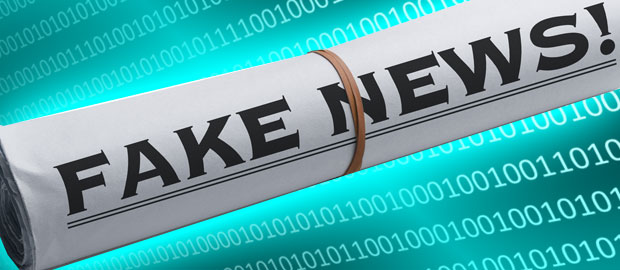
What we do about fake news today could have a major impact on our future. Two new initiatives -- a concerted effort by Apple and a massive educational effort called the "Pro-Truth Pledge" -- could help eliminate much of the fake news BS that is really messing up the United States at the moment.
On another front, President Donald Trump's plan to meet with Kim Jong-un, the supreme leader of North Korea, reminds me a bit too much of a pivotal meeting between Carly Fiorina, who was CEO of HP at the time, and Steve Jobs, who was then CEO of Apple. Fiorina and HP were badly damaged by that encounter, and I'm more than a little worried that something similar could happen to Trump and the U.S.
I'll close with my product of the week: the new second-generation Ryzen processor from AMD.
Fake News
It amazes me how incredibly gullible most people seem to be at the moment. Some of the stuff ordinary people have been doing literally can be suicidal. Take the avoidance of vaccinations, for instance, which sprang from theories that have been debunked. I wonder how much resistance to immunizations may have contributed to the latest flu epidemic, when some schools closed for days at a time because so many students and teachers got sick.
Or consider the insane raw water trend. This hit home because I had to be walked out of the mountains while on survival training after drinking from a stream and getting both really bad dysentery and an infection that could have cost me a foot. The stuff appears to be the latest fad in Silicon Valley at the moment.
For some perspective, watch this clip about raw water -- and listen closely to the background discussion between the supporter and the detractor. This is from The Daily Show, so it is also funny -- until you realize raw water really could make someone sick or possibly even kill a person with a compromised immune system.
Another trend rolling through the valley is based on the meritocracy concept. Intel's CEO is a big believer, but he isn't alone. It seems really intelligent until you look it up and find out that the term isn't related to good management practices but instead is meant as a satirical reference to an idiotic practice in the 1950s. Annoying for me is the fact that meritocracy has been undoing much of the progress toward eliminating forced ranking by replacing it with yet another abusive system that only weakens the firms that practice it.
One of the key takeaways from the book Technically Wrong is that meritocracy has been destroying tech firms -- and the quality of their products. Basically, it is used by people in power to justify misuse of that power.
The mount of false information being handed to the public has reached insane levels. Check out this chart that compares the current president's lies to the previous president's. Even if President Obama's lies were undercounted, as PolitiFact suggests, the people are never the winners in a competition like this.
Our country already fought one war based on a lie. There were no WMDs in Iraq, and the Bush administration tried to cover that up so aggressively that it outed its own CIA agent, as the recent Scooter Libby pardon reminded us.
Every time I consider the subject of fake news, I recall this scene in A Few Good Men. The death of a serviceman was being obstructed by false evidence based on the belief that we can't handle the truth. This has become so bad in Silicon Valley that there is real concern that some have drifted away from reality completely.
Apple's Move
Part of the problem with fake news is the combination of declining revenues to news services with a near-rabid focus on getting clicks. There is so much clickbait out there that it has become almost impossible to avoid it. The only way to correct this, it seems, is to create a paid service with a focus on truth.
Apple has been working on curating a set of news services that have been maintaining a comparatively high level of journalistic integrity. However, the big element is to condition consumers to pay for news again, so that the quality of the content is the overriding driver -- not getting users to click on a piece in the ever-more-desperate hope that they also will read and act on an ad.
Is it an absolute fix? No. Even these news services have been fooled from time to time. Still, Apple has put its significant brand behind it, and I think it's a step in the right direction.
The Pro-Truth Pledge
The Pro-Truth Pledge is a far bigger effort that is also more grassroots. It asks all of us to make a pledge to cite sources, check facts, and stop being a major part of the problem. Ceated by a group of social scientists, the effort is organized by a group of nonpartisan volunteers and connected to the Rational Politics project (a group of folks fighting post-truth politics).
The concept is based on some interesting published behavioral science research that determined that existing methods of ensuring truth in politics don't work.
Trust in mainstream media has dropped, while trust in social media has increased. This is so bad that during the last election the top 20 fake stories were far more widely shared than the top 20 true stories. That reflected our collective move toward fooling ourselves aggressively.
One reason I think Facebook, Google, and other sources of fake news eventually will be nationalized is because they have been able to mislead us so easily. This fake news proliferation on social media has gotten so bad, as thisBFSR study showcases, that it necessitated the creation of the Pro-Truth Pledge as a national-level intervention.
The pledge asks folks to commit to 12 behaviors:
- Verify: Fact-check information to confirm it is true before accepting and sharing it.
- Balance: Share the whole truth, even if some aspects do not support my opinion.
- Cite: Share my sources so that others can verify my information.
- Clarify: Distinguish between my opinion and the facts.
- Acknowledge: Acknowledge when others share true information, even when we disagree otherwise.
- Reevaluate: Reevaluate if my information is challenged, retract it if I cannot verify it.
- Defend: Defend others when they come under attack for sharing true information, even when we disagree otherwise.
- Align: Align my opinions and my actions with true information.
- Fix: Ask people to retract information that reliable sources have disproved even if they are my allies.
- Educate: Compassionately inform those around me to stop using unreliable sources even if these sources support my opinion.
- Defer: Recognize the opinions of experts as more likely to be accurate when the facts are disputed.
- Celebrate: Celebrate those who retract incorrect statements and update their beliefs toward the truth.
An effective way to address confirmation bias, according to the BFSR paper, is to have people research a position they agree on. Requiring them to use references opens the door to their discovering for themselves that their false belief lacks foundation, which encourages them to change their minds.
On the Pro-Truth Pledge site, there is an interesting section under the heading "What is the Impact of the Pro-Truth Pledge?" The response highlights the methods used to change the minds of influencers by helping them debunk for themselves the fake news that previously fooled them. It's an interesting read.
This reminds me of one of my favorite books, True Enough: Learning to Live in a Post-Fact Society, by Farhad Manjoo. It does a better job than most, pointing out just how often we aggressively help fool ourselves and how often and painfully our leaders are fooled. It is a really interesting read.
Wrapping Up: Trump and Jong-un
We are surrounded by fake news, and the president appears to believe a lot of it. A major upcoming event, a planned summit meeting between Trump and Kim Jong-un, reminds me of a meeting that took place years ago between Carly Fiorina and Steve Jobs under somewhat similar conditions. (I got the inside story from HP after the fact.)
Jobs had gotten wind that HP had an MP3 player that was as good as or better than the iPod. He called Fiorina with an offer: Rather than take a risk on your own product, license the iPod and sell it instead. (Apple never does that.) Jobs promised to grant Fiorina a series of concessions in exchange for HP staying out of the market for five years. Those concessions never were granted, the HP iPod failed, and Apple continued to dominate the segment. Jobs effectively took Fiorina to the cleaners because she didn't see the lie.
President Trump has been desperate for some good news. Jong-un has been hinting at promising something he never promised before, and North Korea historically has had issues with keeping promises. I think this is the same pattern that undid Fiorina -- but the result this time, rather than a crippled HP, could be a crippled U.S.
It might help if the folks in the White House were to take the Pro-Truth Pledge and follow its 12 steps in advance of the meeting. I'm not holding my breath, though, and I am starting to wonder if I should prepare for nuclear winter.
By the way, as I was finishing this, I ran into a story about how researchers at George Mason University have come up with a plan for a fake news vaccination. Anyone know how to sign up the president?
It is fascinating that as Intel's CEO has driven the company into decline, at least with regard to influence (here's one example), the efforts of AMD's CEO have helped it to rise. This provides a sharp contrast between two executives that could help ensure that boards make better CEO choices in the future.
In this leadership gap, AMD has launched a new processor that by itself is as good as anything Intel has. With AMD's superior graphics, it is far better than anything Intel can do without Nvidia's help.

2nd Gen AMD Ryzen Processor
The AMD Second Generation Ryzen is wrapped with a set of cool features that appeal to system builders like myself in particular. One of the most interesting is a feature that automatically speeds up the processor when you put on a better cooler. Another allows you to overclock with protections that effectively prevent a black screen. Finally, there is a feature that allows you to use a large, cheap magnetic drive along with a small SSD to get disk performance that rivals an SSD at a far lower cost.
I still love my PCs, and this new Ryzen part represents a decent performance and feature jump in the family. However, it also represents a legitimate alternative to Intel, which under its current CEO, has become a bad actor. We have choice. I think it's best to choose from firms that want to do us good rather than harm. AMD is in the former category, and Intel is in the latter right now, so as a result, the new Second Generation Ryzen is my product of the week.




![music: Ladipoe ft. Tiwa Savage – Are You Down [Prod. Don Jazzy] music: Ladipoe ft. Tiwa Savage – Are You Down [Prod. Don Jazzy]](https://blogger.googleusercontent.com/img/b/R29vZ2xl/AVvXsEistL0aiWXVW22ztGu4Vz0mjXPKUKA0mH-4Q6aOiJY-PkV_z2Keh6V-T8VJZb6QG83zZFlM_7KJjk9LFuPGYN9tIgYcA5hgRjicDl2X5yyF6FufkAo3zS4BRmNjax5KYv8_o-mmIqn3GpQ/s72-c/DK5C_yJW4AA9IKd-720x720.jpg)
![[Gaposa Music]:EASY NET - IFE MI @IAM_EASYNET [Gaposa Music]:EASY NET - IFE MI @IAM_EASYNET](https://blogger.googleusercontent.com/img/b/R29vZ2xl/AVvXsEgOdBvGdv0Y-BksPtMcsmlRdFhsmGTy8jX3NlGMUyyzS20rypHYlB0pON8g9I7TKnoQD4OZKZlAZ4dVn2_QgkYtH6XdT9BbkpYm6HW7_mGLh4hqlDSpU7vpOqpCCfLoWHMyoge7Zw1rWgCv/s72-c/IMG-20170810-WA0002%255B1%255D.jpg)








No comments:
Post a Comment